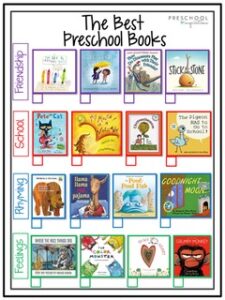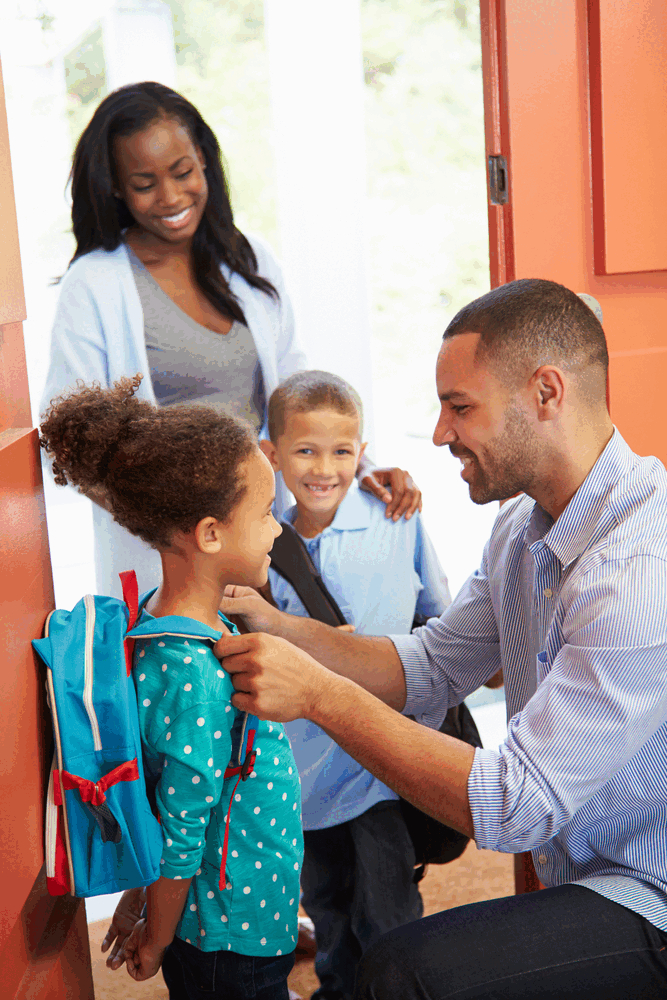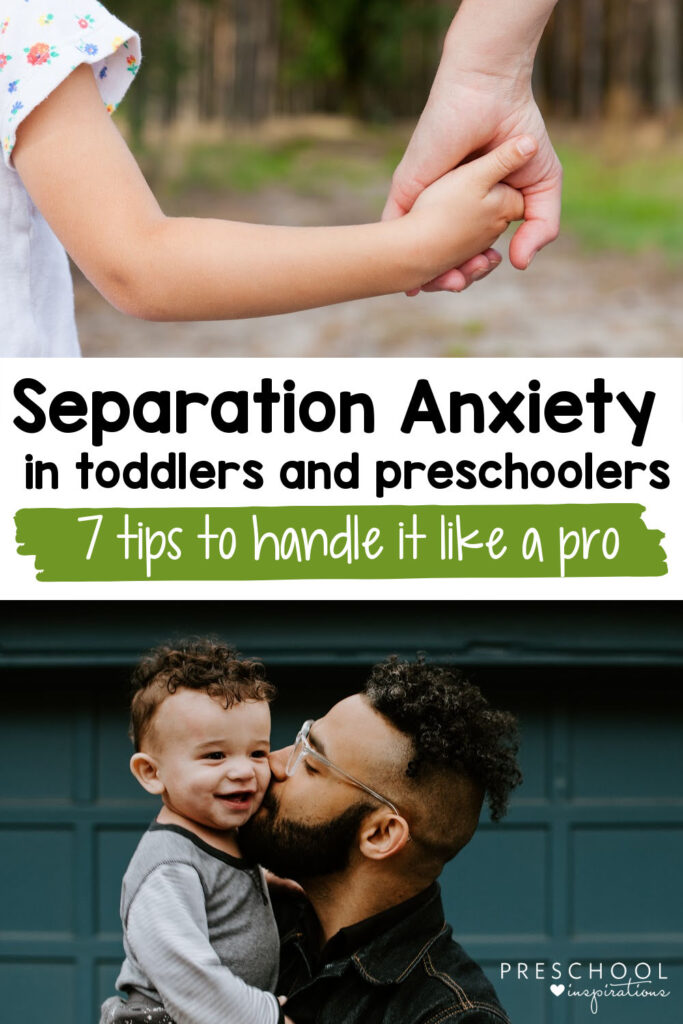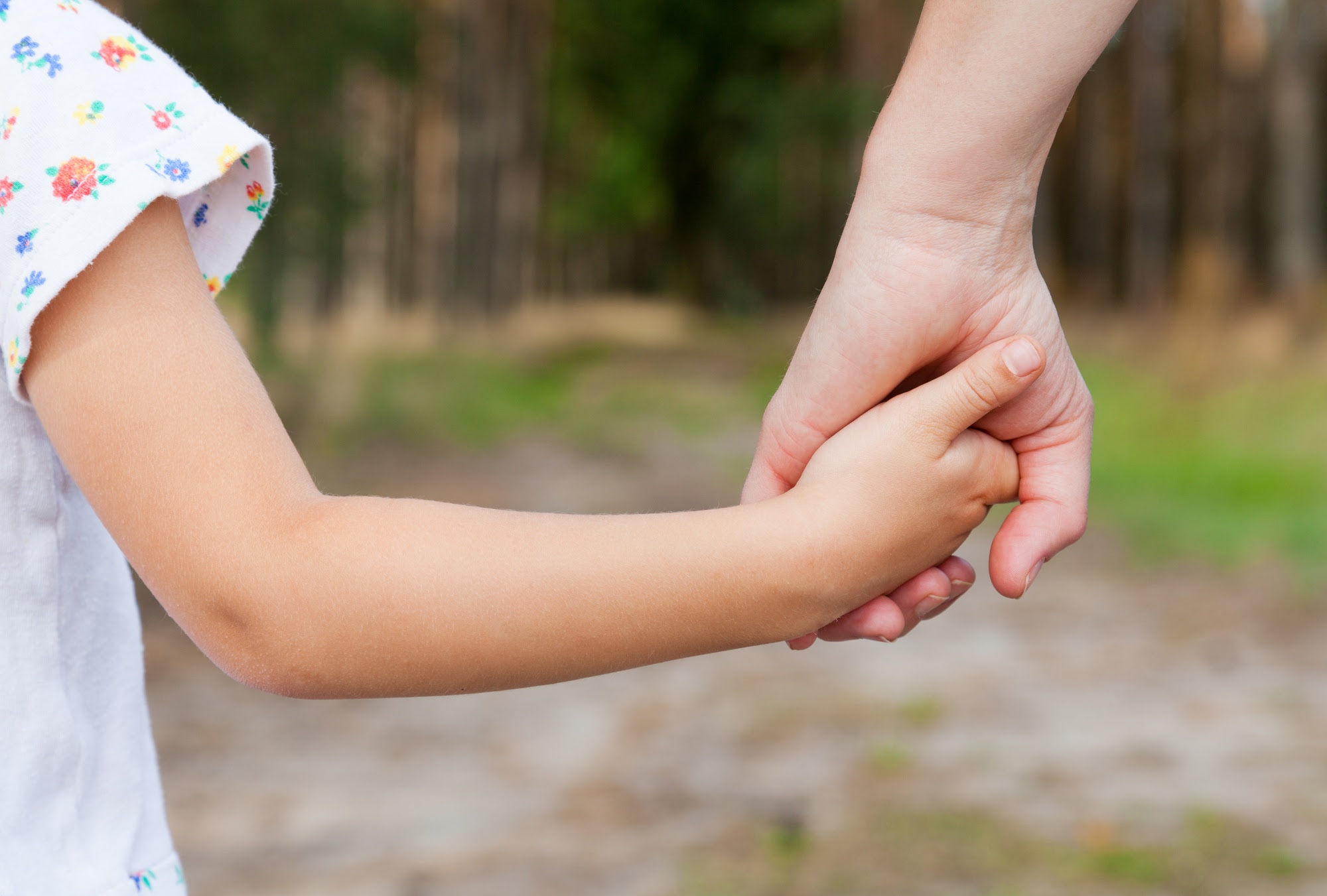Separation anxiety in kids is haaaard! Many of us have been there. Trying to drop our child off at school, childcare, church, the gym, or anywhere for that matter. The tears start streaming, and we feel. . . awful.
With the challenges of the pandemic, this will leave a rippling effect on separation as well. Thankfully, there are ways to make this tough time much easier.
As a veteran preschool teacher and a mom of three, I’ve been on both ends of separation anxiety in toddlers and preschoolers. I’ve been the mom with the crying child, clinging to her leg for dear life.
And I’ve been the caring teacher, prying the sweet little one from mama and soothing them.
Finding the right tools and resources can make a world of difference. I’ve seen a simple fix turn the hardest goodbyes into a gentle tear-free transition.
Raise your hand if you’re ready to make life a little bit easier!
Is Separation Anxiety in Toddlers and Preschoolers Normal?
The word anxiety can trigger a lot of feelings, so rest assured that separation anxiety is a normal part of a child’s development.
As our world becomes more aware of the importance of mental health, anxiety has become more commonplace and widely talked about. While it is definitely a good thing to be more aware and open about anxiety disorders, it can raise questions as to whether your child is experiencing a potentially long term mental health disorder, or if they are just going through a normal stage in their development.
Separation anxiety in kids does not mean that you are a bad parent or that your child will feel this way forever. Separation anxiety in kids means that your child is still learning to bond and trust other adults, and that takes time and connections.
Child psychotherapist Katie Hurley says,
“It’s only natural for kids to feel anxious when saying goodbye to their parents. In fact, separation anxiety is a normal part of child development.”
Typical behaviors that go along with separation anxiety can include clinginess, crying, tantrums, potty accidents, and saying things that the child doesn’t truly mean. These behaviors range from embarrassing to hurtful.
The good news is that are ways you can help, whether you are the parent, teacher, or the caregiver.
Here are our best tips to help relieve the stress to make your child’s drop-off easier.
Easing Separation Anxiety for Toddlers and Preschoolers

Read Stories Together
Preparing for the first day of school is always a huge milestone. High-quality picture books are ideal for helping young children transition to some of the scenarios of the school environment, including meeting new friends, interacting with the teacher, and all the fun of the school day. Snuggling up together with a favorite blanket or lovey and reading together is a great way to set the stage for new beginnings and share quality time together. Use these questions to ask your child what he or she is feeling about starting school.
A perfect book to read at home before school starts is “The Kissing Hand” by Audrey Penn. Chester the Raccoon is having some doubts about his first day of school and leaving his momma. His momma wants to reassure him that he will have a great day at school, so she presses a kiss into his hand and tells him,
Whenever you feel lonely or need a little loving from home, press your hand to your cheek and think mommy loves you, mommy loves you.
It’s a sweet way for kids to keep their families in their hearts on those first days of school.
Check out our list of even more great back-to-school books, filled with preschool favorites. And grab a free printable below, so you can always have a great book on hand!

Ready Confetti and Magic Playdough for Separation Anxiety
A little magic can go a long way to pump up the excitement and anticipation for that first day or week! Try these clever activities to help your little one jump for joy as that first day draws near.
Sometimes falling asleep the night before preschool can be hard as your brain is filled with thoughts of tomorrow. Sprinkle some Ready Confetti under your child’s pillow and read the precious poem with them. Help ease some nighttime worries and with a little magic in a bag!
A great hands-on activity that is therapeutic is trying out some “magic playdough.” The concept is to give your child a plain colored playdough ball and to tell them to squish it. If it becomes colorful, that means they are going to have a great school year.
Simply make a batch of your favorite playdough, poke a small hole in the middle of it (secretly, with no little eyes watching you) add a drop or two of food coloring inside the ball, and patch it up!
Read the magic playdough poem together and invite your child to squeeze the playdough together (also perfect for fine motor strengthening). Celebrate in the magic of the new color and encourage your child that it will be a wonderful school year full of fun, learning, and adventure!
Remind Your Child That You’re Coming Back
If you’ve ever heard the song, “Grown Ups Come Back” from Daniel Tiger, there is something very powerful about it.
As adults, we might overlook that children need to hear that we’re coming back soon to get them. We know that we’ll be back, but they need that extra reassurance. Thankfully, Daniel Tiger comes to the rescue with the absolute perfect song.
In the days leading up to a new drop off routine, talk with your child about how they will go to school without you but that you will come back to get them. You can even teach them the song to help with the process!
If your schedule changes during the day and you need to arrive later than normal, make sure you call your child’s school/teacher to let them know. They can then communicate to your child that you’re running late but are still coming.
Leave a Family Photo with Your Child’s Teacher
You will be on your child’s mind a lot while they are at school. Having a photo of special people in your child’s life is one of the best tools for melting away separation anxiety.
During my preschool teacher days, I always asked parents to provide 1-2 photos of parents, siblings, or of anyone else who is special or extra close to the child.
I’d them keep these photos together in an album in my classroom. When a child would feel sad and start missing mom or dad, I’d give them their photo album to look at. Seeing their mom or dad’s face in the photos turned that frown around. Sometimes saying something as simple as, “I know your mommy misses you too and can’t wait to see you soon” is just the reassurance and security they needed.
When my youngest daughter started preschool, she asked for a locket with my picture in it that she could take to school with her. She said it made her happy to look at my picture anytime she was feeling sad.
Not only did this melt my own heart, but it also provided an easy, practical way to help her with any separation anxiety she may felt while at school. An added bonus was that she could look at it any time of the day that she needed it.
Separation Anxiety Tips for Parents
Keep it Positive

Sometimes getting out the door in the mornings is the hardest part. Your child might tell you everything they don’t like about school or why they really shouldn’t go.
Remind your child about all the things they have to look forward to at school! This is sometimes our saving grace when getting my youngest child into the car and to school each morning.
We talked about her friends, her favorite places to play at school, and everything else that might give her a little bit of FOMO.
If your child is introverted, this might be something you have to do all throughout the entire year. Some children have the best day ever at school, but when it comes time for them to go the next day, they would rather stay in bed, have a sick day, or beg you to spend the day with them.
Help them refocus by reminding them of the best parts of the day. Remind them that they won’t want to miss all of the exciting activities, friends, books, songs, time on the playground, and more!
Feel free to ask your child’s teacher what your child enjoys most during the day or who they sit by during snack and play with on the playground so that you can use specifics while encouraging your child.
Keep it short and sweet
When it’s time for the last goodbye, keep it short and sweet! Put on a smile and tell your child you love him/her in the car or in the hall. . . and then leave.
One of the hardest situations can be when a parent continually needs to say “Goodbye” or “I love you” over and over again. This can add to the emotions your child may be feeling by inadvertently sending the message that something is wrong. A better way to handle this is to remind your child you love them, say goodbye, and head out the door.
Make a quick routine with a goodbye kiss or saying something sweet. Here are some of our favorite fun ways to say goodbye:
Bye, bye butterfly.
See you later, alligator.
Out the door, dinosaur.
See you soon, raccoon.
If you need extra reassurance, that is completely understandable!
Parent self-care tip: Long before your child is feeling sad, chances are that you’ll be feeling emotional too. This is all part of the process. It may help to take care of yourself beforehand so that you’re more prepared when the big day comes. Or so that you aren’t caught off guard by your own feelings that day.
In the days or weeks leading up to that first drop off, take the time to talk to other parents who have already taken this step. Talking to someone who has already been through it will give you valuable perspective and will remind you that you aren’t alone. It’s not easy leaving your child, especially if it’s the first time. But you can do it!
Trust Your Child’s Teacher
A final way that you can encourage your child in dealing with any separation anxiety is by trusting his/her preschool teacher. Some drop-offs will go rough, and you can set the stage for trust to be built. I’ve seen parents tell their child that they love them and that their teacher has so many fun plans for them and is going to take great care of them. This is a perfect way to explain it to your child.
As your child gets to know their teacher, this becomes easier and easier. They will come to see that their teacher cares about them and create a connection that will leave them feeling safe over time. Your child’s teacher will likely have experience working with children with separation anxiety, so utilize their expertise. They want to help make the drop off and day go as smoothly as they can, so that your child has a positive experience at school.
Separation is tough. It’s can be tough on both you and your child. But it is a normal part of your child’s development, and is definitely something that you can work through together. Work with your child and his or her preschool teacher to develop a routine that works for you all. For even more ideas, as well as advice from parents and teachers, visit our friends at Teaching 2 and 3 Year Olds.
If you’ve overcome separation anxiety with your child, feel free to leave your best suggestions in the comments.
- Valentine’s Day Letter Formation Mats - February 4, 2024
- January Preschool Themes You’re Going to Love! - January 1, 2024
- December Preschool Themes You’re Going to Love! - December 1, 2023



Leave a Reply